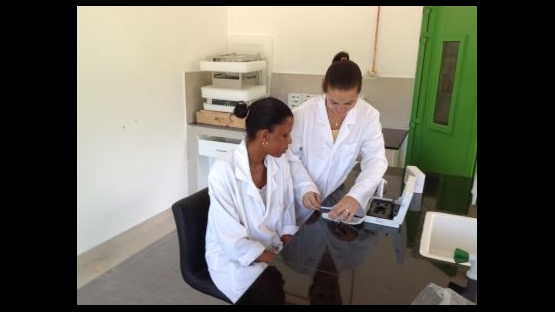A new soil and plant diagnostic laboratory in Seychelles has been officially opened on 1 August 2013. The laboratory is a successful outcome of an IAEA's technical cooperation (TC) project carried out in support of government initiatives to strengthen national infrastructure for research and development in soil fertility management. The laboratory aims to collect, analyse and disseminate soil and plant information for farmers to grow more and better food.
Seychelles has very limited land resources, and faces major problems with declining soil fertility due to inappropriate farming practices and land overuse . Loss of soil fertility, together with water scarcity, has a great impact on food production and food availability, as well as on the livelihoods of people. It is therefore important for Seychelles to develop efficient and effective land and water management practices to improve soil fertility and maximize water use. Through its technical cooperation programme, the IAEA is helping Seychelles to build capacities to address these problems.
To support the establishment of the laboratory, the IAEA supplied the facility with a number of pieces of state-of-the-art analytical equipment for soil, plant, seed and chemical testing. The IAEA also provided training on the use of the new equipment for staff to carry out the required analytical procedures and built additional human resource capacities. The Government of Seychelles has contributed to the project by financing all the necessary civil work, such as the construction of the laboratory and safety management.
"The laboratory is the first of its kind in the country. It will help Seychelles improve soil, water and nutrient management and increase food production", said Lee Heng, soil scientist at the IAEA.
"Isotopic and nuclear techniques can play important roles in providing invaluable information for developing strategies to improve soil fertility and crop performance", said Dazhu Yang, Director, Division for Africa, Department of Technical Cooperation, IAEA. "We believe that building institutional and human capacity in peaceful nuclear technology is key to strengthening local capabilities for addressing problems, such as soil fertility and water scarcity in Seychelles", he continued.
Nuclear and isotopic techniques, which are now available at the laboratory, can be used to determine soil fertility, nutrient and water requirement of the crops. Such data can then be used to develop integrated and improved crop nutrition, soil and water management practices to ensure sustainable food security, and to leave fertile soil for future generations.
Improving Soil Fertility Management Using Nuclear Techniques: A New Laboratory for Soil and Plant Analysis Opens in Seychelles

Background
The expertise and support for the establishment of the laboratory were provided under two TC projects; 'Developing Improved Nutrient Management Practices Using Nuclear and Related Techniques for Enhancing Sustainable Agricultural Productivity' and 'Implementing Nutrient and Water Management Practices Using Nuclear and Related Techniques to Enhance National Vegetable Production through Sustainable Agricultural Management.'
A new TC project titled 'Increasing Crop Production through Effective Management of Soil Salinity in the Coastal Area using Nuclear and Related Techniques' has been proposed for the TC cycle starting in 2014, which would support the development of mitigation and adaptation measures to reduce the effect of soil sodicity and salinity in the coastal zones.


